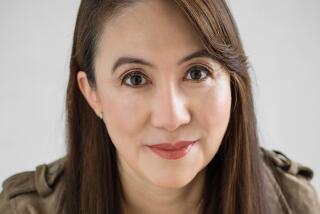Growing Pains (and Pleasures) of PEN USA Center West
founded in 1921 by a group of writers including John Galsworthy, Joseph Conrad, D. H. Lawrence and G. B. Shaw--is a literary mutual benefit society, but mutual benefit has meant in PEN practice not the stuff of writers’ conferences--marketing tips, how to find an agent, etc.--but such things as letter-writing campaigns for writers in prison. When Aleksandr Solzhenitsyn was exiled from the Soviet Union of unhappy memory, it was International PEN President Heinrich Boll who met him at the airport.
In this country, PEN has consisted, for many years, pretty exclusively of the works and pomps of PEN American Center, based in New York with chapters in a number of other cities, including San Francisco. PEN in Los Angeles, however, is not a chapter of PEN American Center and has had a distinct and little-known history of its own.
In a few unusually large or disparate countries, PEN International has franchised two separate, autonomous PEN centers. Canada is one such country, Australia another. In 1952, the United States became a third when PEN Los Angeles Center was established as an autonomous PEN center with the right to establish chapters of its own. What followed on that founding, however, was a far cry from the duplication, in the Western United States, of the admirable programs of PEN American Center.
Around 1980, recently moved to Los Angeles from New York, I was invited to join PEN Los Angeles Center and accepted with alacrity. To my dismay, however, the first, badly edited newsletter I received contained nothing of what I thought of as PEN’s traditional, even historic mission. What it contained, instead, was, among similar examples of hokey boosterism, an item on a member who had placed third in an obscure dog story competition. The contrast between PEN in New York and PEN in Los Angeles was enough to confirm the worst stereotypes about Los Angeles that literary New York might entertain. I asked for my dues money back.
Happily, a few equally disgruntled PEN members did something better than resign: They expanded and reorganized. Malcolm Boyd, president from 1984 to 1987; Digby Diehl, president in 1987-1988; Ruth Harmer-Carew, in various official capacities; and a number of other local writers took the relatively sorry condition of PEN L.A. as a challenge rather than as a cosmic verdict.
Los Angeles has been, notoriously, a city where writers could hide out, but Boyd and Diehl used their considerable personal and professional networks to blow a certain amount of cover. The literary resources--the personnel, you might say--of Los Angeles had for years been much greater than what was reflected in PEN’s membership. During the mid-1980s, that gap began to shrink. Not yet a true roster of the city’s writers, the PEN directory nonetheless began to become an extremely interesting list.
It also began to become something more than a Los Angeles list. There were clusters of writers in other Western cities who kept in touch with Los Angeles through PEN. PEN Los Angeles Center began, somewhat surprisingly, to become what it had apparently been intended to be 35 years earlier. And in fact, in 1988, PEN Los Angeles Center petitioned PEN International to have its name changed.
But to what? That became the question. PEN American Center did not define itself as PEN East, so it seemed inappropriate for PEN Los Angeles Center to be PEN West. There was also an affiliate of PEN American Center in San Francisco that was known as PEN West. Very well then: PEN USA Center. But once this proposal was made, PEN American Center suddenly discovered the East and insisted on a name and a mandate for PEN Los Angeles Center that would stop at the Mississippi. Thus did PEN Los Angeles Center become PEN USA Center West, a name that reads like the twin of PEN USA Center East, though there is no PEN USA Center East.
Names are never all that important, of course. What happened to make PEN International take the request from PEN Los Angeles Center seriously was performance more than ambition, and performance of a fairly concrete sort. In impoverished literary circles, particularly in impoverished Third World literary circles, when a letter to the family of a writer in prison contains not just encouragement but also a little money, it can cause a small sensation. PEN USA Center West has recently been putting some of its money where the general PEN mouth has always been in these matters, and the gestures have been far more generally noticed than the donors ever expected they would be. At a recent PEN congress in Madeira, the warmth of the welcome for the Los Angeles delegation was a surprise to nearly everyone.
Money has also talked in the local life of the group. The growth spurt of the 1980s meant that PEN had enough dues money coming in (if just barely enough) to hire an executive director. After a national search undertaken during the watershed presidency (1988-1989) of Joanne Leedom-Ackerman, the organization hired the exceptionally experienced and able Richard Bray, a longtime bookstore owner and literary activist from Chicago.
It was during Leedom-Ackerman’s term as well that Marilee Zdenek and Marjorie Marks-Frost reformed PEN’s book awards program, and John Farrell gave its newsletter an unwonted size and seriousness. And most recently, during Farrell’s 1989-1990 term as president, PEN USA Center West fielded what was undoubtedly its most impressive calendar of events to date, a response to a decision taken at a 1989 PEN congress in Toronto that PEN centers in Western countries should look to domestic problems--censorship, homelessness, immigrant welfare--and not just to problems abroad. Two among a good dozen events organized in that spirit were a daylong symposium on the 50th anniversary of John Steinbeck’s “The Grapes of Wrath” (including a movie screening and a chili cookout) and a benefit for the homeless on the occasion of the publication of the book “Louder Than Words,” itself a pro bono effort for the homeless by the book trade.
Such events may be only a beginning, but they are at least in the mainstream PEN tradition. Equally in that tradition but with a distinctive Los Angeles flavor is the first event to take place under incoming president, novelist Carolyn See; namely, a “Garden Party and Literary Auction” to be held next Sunday, with proceeds to go “toward PEN’s efforts to free imprisoned writers around the world and to fight all forms of domestic censorship.”
The garden party, held at the start of this year’s Banned Books Week, has won a matching grant of $15,000 from the Los Angeles Department of Cultural Affairs. It has also won the support of actor Richard Dreyfuss, who will serve as auctioneer, and that of “L. A. Law” co-stars Jill Eikenberry and Michael Tucker, who will present PEN’s first “Freedom-to-Write” awards to Rudolfo Anaya, Alice Walker, Matt Groening, Allan Parachini and Harlan Ellison, all honored “for contributions to the struggle against censorship.”
“They aren’t real writers, they’re screenwriters” goes a dismissal of PEN USA Center West still heard in some literary circles. Well, some of them are, but many aren’t. And some--like Bob Ward, PEN vice president, executive co-producer of “Hill Street Blues” and co-executive producer of “Miami Vice”--both are and aren’t: Besides his television work, Ward has published both fiction and poetry.
The relationship of American literature to the American entertainment machine is, to be sure, a Large Question, and PEN USA Center West, for all its new seriousness, has pitched its tent smack in the middle of that question. But how could it do otherwise? Meanwhile, to at least a few imprisoned and writers who are receiving dollars as well as words, a writer in need is a writer indeed. For them, the medium, as we might well put it, is not the message.
More to Read
Sign up for our Book Club newsletter
Get the latest news, events and more from the Los Angeles Times Book Club, and help us get L.A. reading and talking.
You may occasionally receive promotional content from the Los Angeles Times.






